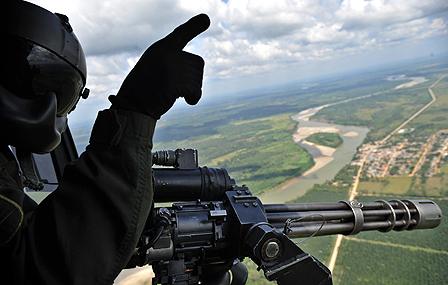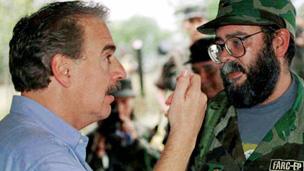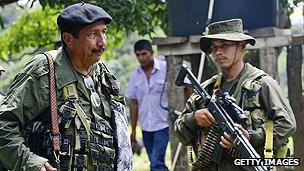Colombia profile - Timeline
- Published
A chronology of key events:
1525 - Spain begins conquest of Colombia.
1536-38 - Spain establishes the settlement of Santa Fe de Bogota, which subsequently becomes known as Bogota, the current capital; becomes part of the Spanish vice-royalty of Peru.

The state has for decades been in conflict with paramilitary groups
1718 - Bogota becomes the capital of the Spanish vice-royalty of Nueva Granada, which also rules Ecuador and Venezuela.
1819 - Simon Bolivar defeats Spanish at Boyaca. Republic of Gran Colombia formed with Ecuador, Panama and Venezuela.
1829-30 - Gran Colombia dissolved when Venezuela and Ecuador split off, leaving present-day Colombia and Panama a separate state known as Nueva Granada.
1849 - Conservative and Liberal parties founded.
1861-85 - Liberal Party rule sees country divided into nine largely autonomous entities and the church separated from the state.
1885 - Start of 45 years of Conservative Party rule during which power is recentralised and church influence restored.
1899-1902 - "The War of the Thousand Days": around 120,000 people die in civil war between Liberals and Conservatives. Panama becomes an independent state.
1930 - Liberal President Olaya Herrera elected by coalition; social legislation introduced and trade unions encouraged.
1946 - Conservatives return to power.
1948 - Assassination of presidential hopeful Jorge Eliecer Gaitan ignites riots in Bogota.
1948-57 - 250,000-300,000 killed in civil war.
1958 - Conservatives and Liberals agree to form National Front in a bid to end the civil war; other parties banned.
Guerrilla war
1964 - Leftist National Liberation Army (ELN) and Maoist People's Liberation Army (EPL) founded.
1966 - Revolutionary Armed Forces of Colombia (Farc, the current largest guerrilla grouping) set up.
1970 - National People's Alliance formed as a left-wing counterweight to the National Front.
1971 - Left-wing M-19 guerrilla group emerges.
1978 - President Julio Turbay (Liberal) begins intensive fight against drug traffickers.
1982 - President Belisario Betancur (Conservative) grants guerrillas amnesty and frees political prisoners.
War against drug cartels stepped up
1984 - Campaign against drug traffickers stepped up following assassination of justice minister.
1985 - Eleven judges and 90 other people killed after M-19 guerrillas force their way into the Palace of Justice; Patriotic Union Party (UP) founded.
Nevado del Ruiz volcano erupts. An estimated 23,000 people are killed in four Andean towns.
1986 - Virgilio Barco Vargas (Liberal) wins presidential elections by record margin. Right-wing paramilitary groups begin murder campaign against UP politicians, amid continuing violence by left-wing groups and death squads run by drugs cartels.
1989 - M-19 becomes legal party after reaching peace agreement with government.
Liberal and UP presidential candidates murdered during presidential election campaign, reputedly at the behest of drug cartels; Cesar Gaviria elected on anti-drug platform.
1991 - New constitution legalises divorce, prohibits extradition of Colombians wanted for trial in other countries and guarantees indigenous peoples' democratic rights, but without addressing their territorial claims.
1993 - Pablo Escobar, Medellin drug-cartel leader, shot dead while trying to evade arrest.
1995 - Ernesto Samper Pizano (Liberal) elected president and is subsequently charged and cleared of receiving drug-cartel money for his election campaign.
Peace talks

President Pastrana, seen meeting a Farc rebel chief, presided over Plan Colombia, designed to fight drugs and left-wing rebels
1998 - Andres Pastrana Arango - a Conservative - elected president, begins peace talks with guerrillas.
1998 November - Pastrana grants Farc a safe haven the size of Switzerland in the south-east to help move peace talks along. The zone is off-limits to the army.
1999 January - Peace talks formally launched but proceed in stop-start fashion. Pastrana and Farc leader Manuel "Sureshot" Marulanda meet.
1999 January - Powerful earthquake kills some 1,000 people. Cities of Armenia and Pereira badly hit.
Plan Colombia
2000 July - Pastrana's "Plan Colombia" wins almost US$1 billion in mainly military aid from the US to fight drug-trafficking and rebels who profit and protect the trade.
2000 September - Government freezes talks; alleges Farc harboured hijacker of plane forced to land in safe haven. Later, Farc refuses to resume talks, accuses Pastrana of not stopping paramilitary groups.
2001 February - The Farc return to peace talks after meeting between "Sureshot" and Pastrana. Pastrana extends demilitarized area for eight months.
2001 June - Farc rebels free 359 police and troops in exchange for 14 captured rebels. Farc accused of using safe haven to rearm, prepare attacks and conduct drug trade.
2001 October - Government, Farc sign San Francisco agreement, committing themselves to negotiate ceasefire. Pastrana extends life of safe haven until January 2002.
2002 January - Pastrana accepts Farc ceasefire timetable and extends safe haven until April.
Talks fail
2002 February - Pastrana breaks off three years of tortuous peace talks with Farc rebels, says hijacking of aircraft hours earlier is final straw. He orders rebels out of demilitarised zone. Government declares war zone in south after rebels step up attacks.
2002 May - Independent candidate Alvaro Uribe wins a first-round presidential election victory, promises to crack down hard on rebel groups.
2002 August - Moments before Alvaro Uribe is sworn in as president, suspected Farc explosions rock Bogota. Twenty people are killed. Days later, Uribe declares state of emergency.
2003 October - 14 out of 15 of President Uribe's planned austerity measures and political reforms rejected by voters in referendum. Three ministers, national police chief resign.
2003 November - Fighters from right-wing United Self-Defence Forces of Colombia (AUC) begin to disarm.
2004 May - Farc's Ricardo Palmera, the most senior Colombian guerrilla ever captured, is jailed for 35 years.
2004 July - Right-wing AUC and government begin peace talks. AUC leaders address Congress.
2005 January - Bitter 15-day dispute with Venezuela over the capture of a Farc leader on Venezuelan soil. The affair is resolved at talks in Caracas in February.
2005 June - New law offers reduced jail terms and protection from extradition for paramilitaries who turn in their arms. Rights groups say the legislation is too lenient.
2005 December - Exploratory peace talks with the second biggest left-wing rebel group, the National Liberation Army (ELN), begin in Cuba.
2006 February - Colombia and the US agree on a free trade deal. The agreement awaits ratification in both countries.
Uribe's second term
2006 March - Parties loyal to President Uribe win an overwhelming victory in parliamentary elections.
2006 May - President Uribe wins a second term in office.
2006 November - Court investigates possible ties between high-ranking politicians from Sucre department and right-wing paramilitaries.
2006 December - Detained paramilitary leaders say they are pulling out of a peace process. Government says demobilisation of right-wing groups will continue.
2007 January - Ecuador turns to the Organisation of American States (OAS) for help with its challenge to Colombia's coca crop-spraying programme along their common border.
2007 June - Government releases dozens of jailed Farc guerrillas, in hope that rebels will reciprocate by releasing hostages. Farc rejects move, saying it will only free hostages if government pulls back troops and sets up demilitarised zone.
2007 July - Hundreds of thousands protest in Bogota against kidnappings and conflict in the country.
Hostage release talks
2007 September - In his role as mediator, Venezuelan President Hugo Chavez agrees to invite rebels for talks on hostage release deal.
2007 November - Colombia sets deadline of 31 December for President Chavez to reach deal with rebels on prisoner swap.
2007 November - Venezuelan President Hugo Chavez withdraws his country's ambassador to Bogota in a row over his role in negotiations between the Colombian government and rebel forces.
2008 January - The Farc releases two high-profile hostages, Clara Rojas and Consuelo Gonzalez, as a result of Mr Chavez's mediation.
Mr Chavez calls on the US and European governments to stop treating Colombian left-wing rebel groups as terrorists, but Mr Uribe rejects the idea.
2008 March - A Colombian cross-border strike into Ecuador kills senior Farc rebel Raul Reyes and sparks a diplomatic crisis with both Ecuador and Venezuela.
2008 May - Colombia extradites 14 paramilitary warlords to the United States to stand trial on drug trafficking charges. US hails move as evidence Colombia deserves trade deal. Colombian opposition complains the extraditions mean that the militia leaders will not reveal their alleged links to political allies of Mr Uribe.
Farc announces death of its leader and founder, Manuel Marulanda.
2008 June - Colombia renews low-level diplomatic relations with Ecuador.
Betancourt freed
2008 July - Colombian army rescues the country's highest-profile hostage, Ingrid Betancourt, held in captivity for six years by Farc. She was among 15 hostages freed in an operation in the southern-central region of Guaviare.
2008 November - The sudden collapse of pyramid investment schemes - used by some of the poorest savers - triggers violent protests. Several towns are put under curfew.
2009 February - Farc rebels free six high-profile hostages, including a former provincial governor held since 2001.
2009 March - Farc releases a Swedish man thought to be the group's last foreign hostage, Erik Roland Larsson.
President Alvaro Uribe offers Farc rebels peace talks if they halt "criminal activities" and declare a cease-fire.
2009 July-August - Relations with Venezuela deteriorate again after plans to allow US troops to use Colombian military bases as part of a drive to curb drug-trafficking are unveiled.
Venezuela withdraws its ambassador from Bogota and freezes relations after the Colombian government accuses Caracas of supplying arms to Farc rebels; Venezuelan President Hugo Chavez accuses Colombia of carrying out a military incursion into his country.
2009 October - Colombia and US sign deal giving the US military access to seven Colombian bases.
2009 November - Venezuelan President Hugo Chavez urges his armed forces to be prepared for war with Colombia and orders 15,000 troops to the border, amid growing tensions.
Former army Gen Jaime Humberto Uscategui is given 40-year jail sentence for his role in killing of unarmed civilians by right-wing paramilitaries.
Common cause
2009 December - The Marxist rebel groups - the Farc and the smaller National Liberation Army (ELN) - announce that they intend to stop fighting each other and concentrate on attacking the armed forces.
2010 July - Venezuela cuts diplomatic ties with Colombia after being accused of harbouring Farc rebels.
2010 August - Juan Manuel Santos takes over as president, having won easy victory in run-off election in June. He responds to a Farc offer of talks by insisting that the rebel group must first release all the hostages it still holds.
Colombia and Venezuela restore diplomatic ties.
2010 September - Farc steps up its campaign of violence. Colombian army kills senior Farc commander Mono Jojoy in air strike in Macarena region.
2011 February - Farc releases several hostages in what it describes as a unilateral "gesture of peace" to the government.
2011 May - Senate approves law to compensate victims of civil conflict and return land to millions of displaced people.
2011 August - President Santos outlines new tactics against rebels, who have increasingly been resorting to hit-and-run raids.

Commander Jairo's rebel Farc guerrillas still present a major challenge
2011 September - Former intelligence chief Jorge Noguera - a close ally of former president Alvaro Uribe - is sentenced to 25 years in prison for collaborating with paramilitary death squads.
2011 October - US Congress passes long-delayed free trade agreement with Colombia, despite concerns over country's poor record of labour relations.
2011 November - Colombian military kills Farc leader Alfonso Cano, who succeeded founder Manuel Marulanda in 2008. Timoleon Jimenez, alias Timochenko, becomes new leader of the guerrilla group.
2012 August - President Santos says exploratory talks are under way with Farc, and that the ELN armed group has also indicated a readiness to talk. Congress approves a law providing for peace talks in June.
2012 October - President Santos apologises to indigenous leaders in the Amazon region for the killing of 80,000 indigenous people in the 1912-29 rush to harvest latex in the area.
One of Colombia's most wanted drug dealers, Henry de Jesus Lopez, is arrested in Argentina. He is the suspected leader of the Urabenos gang, which controls much of the drugs trade in northern Colombia.
New push for peace
2012 November - Farc rebels declare a two-month ceasefire as peace talks with government begin in Cuba.
International Court of Justice in the Hague rules that a group of disputed Caribbean islands belong to Colombia, not Nicaragua, but expands the disputed maritime border in favour of Nicaragua.
2014 June - President Santos wins another four-year term in office.
2015 January - President Santos says government ready for bilateral ceasefire with Farc, after welcoming Farc's December unilateral ceasefire.
2015 September - The government and Farc to set up special courts to try crimes committed during conflict, as well as truth commission and amnesty law.
2015 December - The two sides sign a key deal on paying reparations and ensuring justice for victims of the conflict.
2016 March - The government and Farc delay the signing of a final agreement, citing remaining differences at the talks, and will now seek a deal by the end of 2016.
The government says it is starting formal peace talks with the ELN armed group.
Peace deal
2016 June - The government and Farc sign a definitive ceasefire and disarmament agreement, a precursor to a comprehensive peace deal.
2016 September - The government and Farc sign a historic peace accord that formally brings to an end 52 years of armed conflict.
2016 October - Voters reject government's peace deal with Farc by a narrow margin in a national referendum. President Santos vows to continue talks with the rebels. He is awarded the Nobel Peace prize for his efforts to bring the long-running conflict to an end.
2016 November - The government and Farc sign a revised peace deal after an earlier agreement was rejected in a popular referendum amid objections that it was too favourable to the rebels.
2017 June - FARC rebels formally end their existence as an armed group, after a campaign lasting half a century.
2017 October - A temporary ceasefire between the government and the rebel National Liberation Army (ELN) comes into effect after more than fifty years of conflict.
2017 November - A year after the peace treaty was signed with FARC militants, dissidents of the rebel group continue to battle the armed forces.
2018 May - Peace talks resume between the government and the ELN rebel group.
2018 June - Ivan Duque wins the presidential election.
2019 August - Fomrer Farc rebel group commander Ivan Marquez defies 2016 peace agreement and calls on supporters to take up arms again.